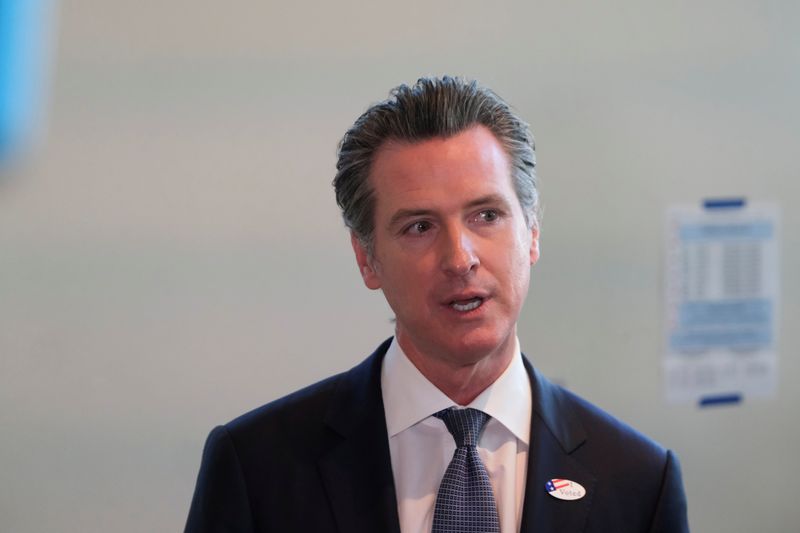SACRAMENTO, Calif. (Reuters) – California would slash spending on education and cancel plans to expand healthcare under a revised budget proposed on Thursday by Governor Gavin Newsom as coronavirus-related woes thrash the world’s fifth-largest economy.
Newsom, a Democrat, cut his proposed budget for the next fiscal year by $19 billion from his original proposal in January, bringing spending below even current fiscal-year levels.
The revised budget would cut funding for public schools and universities, environmental protection and natural resource management, and dramatically scale back programs planned when the state was flush with cash just a few months ago.
State employees will be asked to accept pay cuts of 10%, and agencies will be expected to increase efficiency by 5%, Newsom told a news conference in the state capital, Sacramento.
The proposal, which must be approved by the Democratic-controlled state legislature, is meant to help close a $54 billion gap in spending over two fiscal years – the current year as well as the one beginning July 1.
“We are at a time that is simply unprecedented,” Newsom said.
Newsom started out in January with big ideas, recommending in a proposed $222 billion budget for the next fiscal year that the state set up its own generic drug label, expand public preschools, combat homelessness, and spend more on education from elementary school to college.
But the coronavirus has severely weakened California’s once-robust economy, wiping out billions in anticipated revenue from taxes on income and sales and leaving the most-populous U.S. state with a predicted 18% unemployment rate for 2020.
A fiscal update prepared by Newsom’s Department of Finance last week showed that 4.2 million people had filed unemployment claims since mid-March, when businesses began closing down under public health restrictions aimed at slowing the spread of the virus.
Along with other expenses incurred fighting the pandemic, California is now expected to face a budget gap of $13.4 billion in the current fiscal year, and $40.9 billion next year, the Department of Finance has said.
That is a dramatic change from the $5.6 billion surplus and $21 billion in reserves the state was expecting before the pandemic shut down its economy. The state is required by law to balance its budget.
SEEKING FEDERAL HELP
Gone from Newsom’s revised proposal are plans to expand the state’s Medi-Cal system to cover immigrants in the country illegally who are older than 65, as well as a plan to improve access to dental care.
Spending from the state’s main budget on elementary and secondary education would be cut by about $7 billion over the current fiscal year, and funding for colleges and universities would drop by nearly $2 billion.
The budget would be cut even further if the federal government does not provide additional relief to the states as the coronavirus pandemic continues to ravage the economy, Newsom said.
Democrats in the U.S. House of Representatives this week unveiled a $3 trillion-plus coronavirus relief package with funding for states, businesses, food support and families, only to see the measure flatly rejected by Senate Republicans.
Newsom and the governors of several other Western states this week requested $1 trillion in aid from the federal government to help defray some of the costs of fighting the coronavirus pandemic and its economic impact.
He used his budget presentation to implore Congress for help.
“That’s the purpose of the federal government – to protect us,” Newsom said. “We’re doing our best to support people in need but we now need the federal government to help support not only the state of California but other states across this country.”
(Reporting by Sharon Bernstein; Editing by Rosalba O’Brien and Peter Cooney)





















